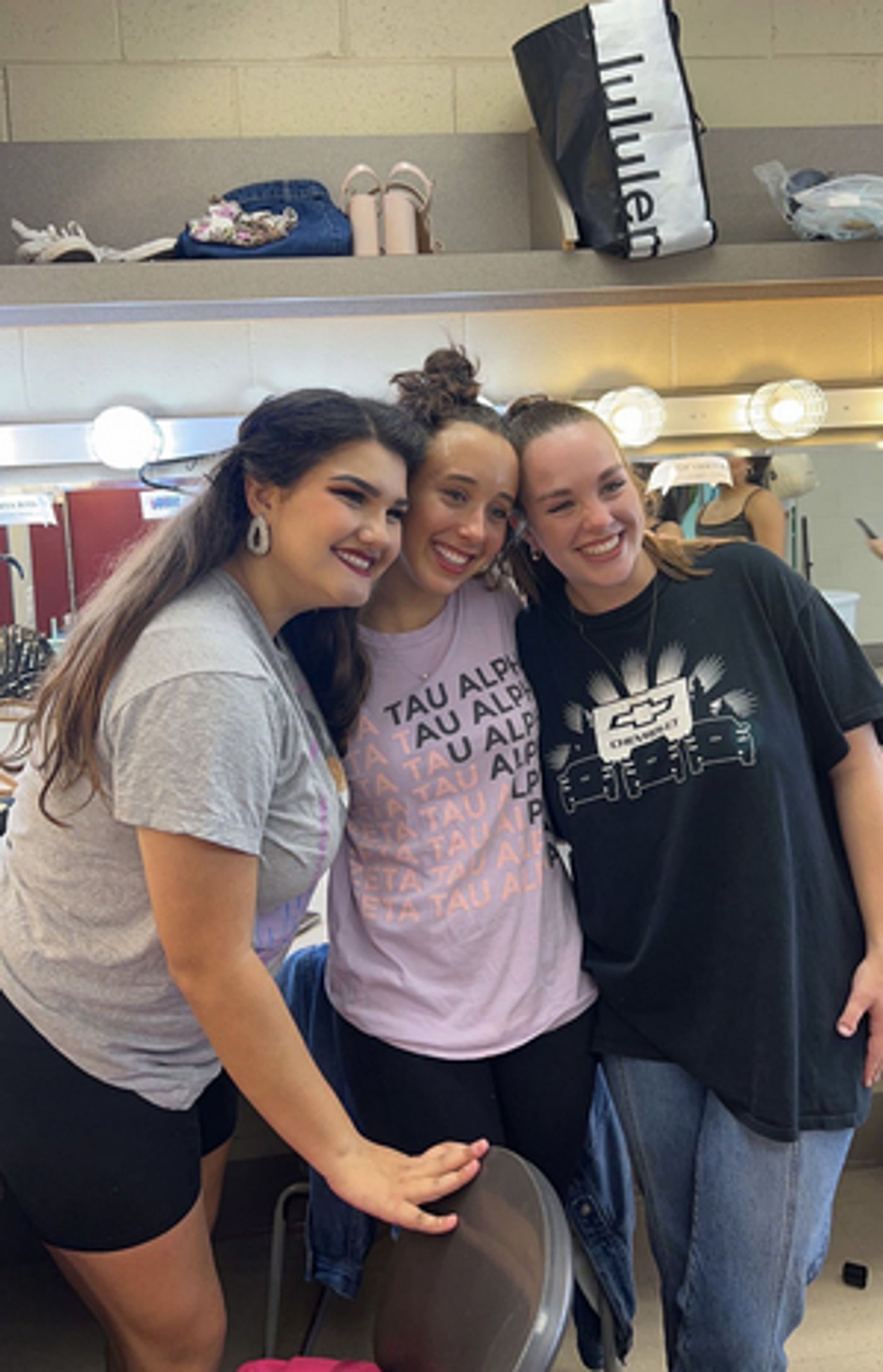Student Blog: Swinging a Show: It's Not Just a Job…It's a Test of Will
Just a bit of insight into one of the most overlooked parts of your playbill. A reflection on my experience swinging in Rider University’s production of The Prom.


that went on for the first full
dress rehearsal of The Prom!
When Covid-19 plagued the world and the Broadway stage, swings gained far more recognition than ever before for truly embodying our industry’s motto; “the show must go on”. The social media pages of audience members and theatre lovers alike were flooded with a swings’ empowering first stage bow, a casts’ insurmountable support, and a stage manager’s, “You will be on for ____ tonight” text that one only dreams about.
When cast as a swing in Rider University’s production of The Prom (for which I covered three ensemble tracks, the role of Shelby, and was also a pit singer!), I won’t lie, I dreamt of the images presented on Instagram’s For You page (FYP).
Prior to starting rehearsals for The Prom, a friend recommended that I read a book entitled, Broadway Swings by J. Austin Eyer and Lyndy Franklin Smith, which outlined various rehearsal techniques for swinging. However, most of the book was spent sharing individual anecdotes from Broadway swings themselves. Initially, I was disappointed by how little time was devoted to swinging techniques and how much more was spent encouraging the reader through metaphors and words of wisdom about the mental fortitude necessary for the job.
Reflecting on The Prom a month later, I completely understand.
Squeezed into the very back corners of the rehearsal studio, there is barely enough space to run choreography full out. You are memorizing all dances in the show (having to reverse everything to prepare for either side of the stage), tracking the movements and individual acting choices of each performer, noting all directorial changes, and retaining various harmony parts in each song.
I would return home after our nightly rehearsals, finish homework, and then run through as many scenes in each track as I could before my eyes forcibly shut compelling me to sleep. This often included transferring my scribbled notes from that night’s rehearsal onto a much larger and color coordinated tracking sheet on my computer to stay organized. It was very important for me to do this after each rehearsal to ensure that I stayed up to date with all the new material. I honestly loved being a swing. I really enjoyed the mental gymnastics swinging required of my brain. I was always on in rehearsal, and I felt my eyes move a mile a minute as I tried to keep up with each person I was covering. I would often use Sundays (our day off) to go into the rehearsal space and run all choreography, drilling whatever pieces I had missed or hadn’t had the time to master during the week. The rehearsal videos became my addiction. And my computer and notebook became my best friends.
If you are unfamiliar with the role of a swing (a cast member who does not perform in the show regularly but who covers the roles of multiple ensemble members), the process described above may seem daunting and exhausting. It was. However, I recognize the thousands of people that came before me in this role and the thousands more that will come after. The theatre world has shined quite a light on the work of swings and so while I feel it necessary to share a glimpse of my own process, that really isn’t the point of this article. The Sundays spent practicing choreography alone shine light on a significant aspect of swinging that isn’t always talked about and Instagram’s FYP certainly does not convey.
SWINGING IS A LONELY JOB.
Collaboration is what makes theatre special. It’s the side stories you create with castmates on stage as you build the background of a scene, it’s trusting that the dance partner you just met won’t drop you in a lift, it’s problem solving with the creative team when things just don’t click. It’s even the silly faces shot across stage to other actors waiting in the wings and the backstage shenanigans in the dressing rooms.
However, in contrast, a swing’s job requires a lot of alone time. It requires solo rehearsals in the dance studio. It requires sitting silently in the back of the rehearsal room, unable to take part in the magic of creation. It requires walking into the dressing room and claiming your spot on the floor because the people performing have priority over the limited makeup counters in the space (this is completely understandable, yet does add to feeling distant from the cast). It also requires walking out on opening night after watching the magic from backstage with an anxious mix of fulfillment and hollowness in your stomach. And finally, it requires watching your castmates be congratulated for all of their work and talent (which they completely deserve!!!) and standing next to them sometimes invisible to the admiring crowd.
Tech week personifies this loneliness as you move from dancing in the back of the room (where you shared in the cast’s energy) to sitting in the back of the house, by yourself. As the cast begins to bond backstage, you sit in the dark, organizing your notes and observing the show’s flow as tech week progresses.
As the show moves out of tech, into full dress and then final dress rehearsal, you start seeing your work come to a close (this feeling may be more relatable for swings of college productions whose show run times are limited) . Signs of castmates calling out begin to dim, as sprained ankles are wrapped, conflicts are resolved, and sickness is treated with an assortment of over-the-counter drugs.
DON’T START FEELING SORRY FOR YOURSELF!
These feelings, while understandable, are part of the job. It is paramount that you continue to work hard during these tiring days and continue reviewing choreography and tracks to keep your body and mind in the show. Because just when you least expect it, that, “You will be on for Shelby tonight” appears on your lock screen.
I had just finished six hours of class. I was dilly dallying in my kitchen, cooking dinner without haste as I expected to arrive at the theatre to watch our first full dress rehearsal as I had every night prior. But if I had learned anything from this job, it was that this process and this industry are anything but predictable.
I got the text at 6:05pm with a call time of 6:30pm. At 6:12pm, sweaty from my last jazz class, with my hair messily arranged in a bun, and no makeup, I was headed out the door. I never felt my body shake as much as it did that night—probably a combination of the nerves and the fact that I left my dinner on the stove, uneaten. The next hour was quite a blur. As people lined up on stage in full hair, makeup, and costume for mic check, I stood walking through my track (still in my joggers and sports bra, btw.) with our outstanding dance captain who filled me in on any fuzzy spots I had in complex scenes. Five minutes to places, I threw on my costume, some light makeup, and my el-natural frizzy curls were pulled up into a high pony. We actually had three unbelievable understudies/swings go on for that run!
In between acts, I was running different numbers and reviewing blocking to make it through the rest of the show. Huge shoutout to my best friend on stage and in life, Megan Lozito, for literally pulling me downstage so I didn’t miss a cue and mouthing to me from the wings that I was in the wrong spot without an ounce of criticism or judgement. No matter how prepared, you will always be figuring out a few aspects of the show as you go. For example, you might know your prop is placed stage right. However, searching for a tiny black marker amongst the dozens of props, in pitch black, when you have not done it before sends your heart palpitating at a rate not even triathletes have experienced. That night, an indescribable amount of joy and adrenaline surged through me, accompanied by unwavering support from our loving cast. Swinging was an incredible experience. There is something so exhilarating about having to trust your body so completely, you just let the muscle memory take over on stage. Performing was no longer a given. It was a gift. And I felt profoundly grateful.
Reflecting on this experience, swinging taught me so many valuable lessons about performance as a whole.
FIRST, mistakes are inevitable.
Our industry thrives on the glitz and glamour of an opening night, the final product. The process wrapped up in a perfect bow. The perfection. After all, that is the only part of the process the audience (and social media) gets to see. However, in doing so, we are neglecting the very essence of theatre itself because not only is perfection unrealistic, it’s also fake. I can count more than one late entrance, a dropped line, and several wrong moves from my night swinging on as Shelby. However, live theatre is about more than the final bow. It’s about the process. It’s about the mess-ups. It's about embracing changes onstage as they come (swinging or not). Most importantly, it’s about portraying humanity. If you can portray a human experience onstage, if the audience can empathize with the story you’re telling, you have done your job perfectly. However, if you keep striving for perfection in a project, not only are you missing out, but you will also be farther and farther away from the goal itself.
SECOND, validation in this industry, must come from within.
I'll be honest. I did experience some guilt for feeling lonely throughout this process because I knew it was part of the job and I wanted so badly to just accept that fact. But intellect and emotion are two different things. Be cognizant of how difficult it is to be wise when wallowing in self-pity is so much easier. The reality is that it’s natural to do this, so give yourself a break! If you are going to master being a swing, it will take time to get used to some of the feelings that accompany the job. Although the accolades and adoration from an excited audience are thrilling, it’s critical we remember that we cannot rely on that for confirmation that we are good at what we do. Work to feel secure in your talent and efforts so that you don’t need a place in the dressing room to feel a part of the cast. Because truth be told, even if your success was written all over a billboard in Times Square, some people wouldn't agree that you belong there.
That's why, in this life, it's crucial that you believe you do.

Videos


